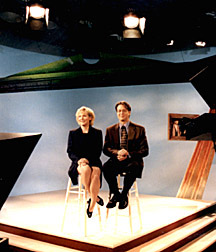

Pitching duo Susan Murphy and Brian Fuqua appear in a sample fundraising break produced for a CPB-funded study on remote pledging. (Photo: Joe Federico.) |
Originally published in Current, Dec. 7, 1998
Public TV's on-air fundraising pros are finding that going remote can boost their pledge totals. With successful "remote pledge" events that aired recently in medium and small metro areas, stations have pulled in pledges with shared celebrity appearances while saving the costs of producing their own live breaks.
Remote pledging helps "smaller stations face the costs of pledge," said Brett Kelly, an on-air fundraising veteran now testing the effectiveness of pre-produced breaks in a CPB-backed study. Kelly is working with TRAC Media Services on the project.
PBS will feed a sample break produced for the Remote Fundraising Break Study on Dec. 9 and 10. It features WLIW producer Susan Murphy and actor Brian Fuqua pitching an Andrea Bocelli special. Formal research will be conducted in March with 12 yet-to-be-enlisted stations.
The study will test the effectiveness of pre-produced remote breaks compared to those produced locally and broadcast live. Researchers also will examine whether the presence of in-studio phonebank volunteers affects phone activity, and the effects of celebrity appearances on pledge response.
Kelly credited the "Virtual Suze" breaks from KTCA, Twin Cities, for launching the remote pledge phenomenon. For stations' summer drives, KTCA produced a live-to-tape pledge simulation that featured Suze Orman, the personal finance guru whose formula for on-air fundraising success brought the heaviest pledging in both the March and August drives.
The "Virtual Suze" package offered stations the "flexibility to use it whenever it fit best in their schedules," said Erika Herrmann, KTCA producer. "We crafted the breaks to make them a more generic sell of PBS."
Stations in Florida and the South's five-state Five Star Network also have found success with remote pledge broadcasts, according to Kelly.
On Nov. 30, Tampa station WEDU produced and uplinked a special featuring in-studio pitches by life-extension speaker Gary Null. Six stations--two from outside of Florida--picked up the remote broadcast, according to Claire O'Connor-Solomon, WEDU membership director. The broadcast raised $120,000 for WEDU, almost five times what the station normally raises on a good night, she reported. WUFT in Gainesville took in more than six times its normal pledge receipts. WEDU will uplink a live special on Dec. 9 featuring Jack Canfield, an author of the Chicken Soup books.
Delivering the pledge specials puts no additional burden on WEDU, according to O'Connor-Solomon. "We pledge so much that it's not difficult," she added. Participating stations share the costs of uplinks and appearance fees. "It enables them to have a guest they couldn't ordinarily get." The only staff the remote stations need for the night is a control operator.
Georgia PTV has performed a similar function for fellow members of the so-called Five Star Network that includes Alabama ETV, Arkansas ETV, Louisiana Public Broadcasting, and Mississippi ETV, according to Babette Davidson, program manager and on-air pledging talent.
Being located in the 10th market makes it easier for GPTV to attract guests, and it's made a regular practice of offering feeds of high-profile guest appearances to other Five Star stations. "Making guests available really bumps up the results for smaller stations," said Davidson. Last Thursday GPTV offered a "virtual pledge" feed featuring singer Patti Page.
Crafting pitches for the remote breaks is challenging, noted Davidson. Participating stations have to agree on premium prices, and she has to make sure that descriptions of public TV programming accurately reflect what can be seen on all stations.
There's also the ad-libbing factor. Davidson is so accustomed to calling for viewer support of "GPTV" that refraining from doing so adds to the already high-pressure strain of live pitching. She also questions whether dropping local references may make the breaks less effective for GPTV. "We're looking closely at how to maximize our dollars and theirs," she adds.
 |
To Current's home page |
| Earlier news: Suze Orman brings home-shopping knowhow to public TV pledge drives. | |
| Later news: Canned "virtual" pledge drives spread among stations, lose local feel. |
Web page posted Jan.
2, 1999
Current
The newspaper about public television and radio
in the United States
A service of Current Publishing Committee, Takoma Park, Md.
E-mail: web![]() current.org
current.org
301-270-7240
301-270-7240
Copyright 2002